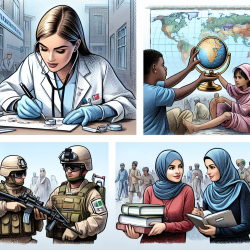Introduction
In an ever-evolving world, the role of forensic science extends beyond traditional criminal investigations. It plays a pivotal role in addressing global humanitarian and human rights issues. The Humanitarian and Human Rights Resource Center (HHRRC), established by the American Academy of Forensic Sciences (AAFS), is at the forefront of these efforts. This blog explores how practitioners can enhance their skills by engaging with the initiatives of the HHRRC, as outlined in the research article "The Humanitarian and Human Rights Resource Center: support to address global forensic issues."
Understanding the HHRRC's Mission
The HHRRC was formed to bridge the gap between forensic science and global humanitarian needs. It seeks to apply contemporary forensic science principles to humanitarian and human rights projects worldwide. The Center not only provides support to AAFS members involved in these projects but also encourages others to increase their participation. The HHRRC recognizes that practitioners involved in such projects often gain invaluable personal and professional growth.
Key Initiatives and Opportunities
The HHRRC has implemented several initiatives to support forensic practitioners in their humanitarian efforts:
- Resource Compilation: The Center has assembled subcommittees to gather and distribute documents, laboratory protocols, and educational materials, enhancing practitioners' access to critical resources.
- Equipment Evaluation: A dedicated subcommittee evaluates equipment needs for projects, exploring cost-effective solutions to meet these requirements.
- Volunteer Database: The Center maintains a database of volunteers from AAFS sections who are eager to contribute to global forensic projects.
- International Advisory Council (IAC): The IAC evaluates proposals for support, ensuring that resources are allocated to projects with the greatest need.
Enhancing Skills Through Participation
Forensic practitioners can significantly enhance their skills by engaging with HHRRC initiatives:
- Hands-On Experience: Participation in global projects provides practitioners with hands-on experience in diverse forensic applications, broadening their expertise.
- Networking Opportunities: Engaging with international projects allows practitioners to connect with experts worldwide, fostering valuable professional relationships.
- Personal Growth: Working on humanitarian and human rights projects offers a personally enriching experience, emphasizing the importance of empathy and cultural sensitivity.
Encouraging Further Research
The HHRRC encourages practitioners to delve deeper into forensic science applications in humanitarian contexts. By exploring the research article "The Humanitarian and Human Rights Resource Center: support to address global forensic issues," practitioners can gain insights into the Center's initiatives and the broader impact of forensic science on global humanitarian efforts.
To read the original research paper, please follow this link: The Humanitarian and Human Rights Resource Center: support to address global forensic issues.
Conclusion
The HHRRC stands as a testament to the power of forensic science in addressing global humanitarian and human rights challenges. By engaging with the Center's initiatives, practitioners can enhance their skills, contribute to meaningful projects, and make a positive impact on the world. As forensic professionals, we have the opportunity to be at the forefront of change, using our expertise to promote justice and human rights on a global scale.










